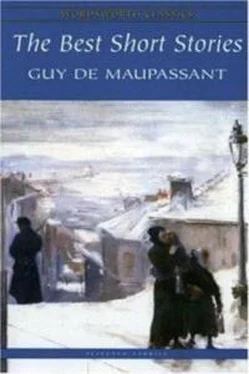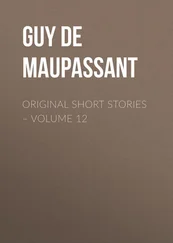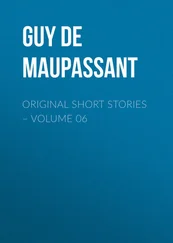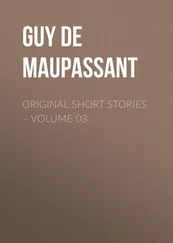Ги Мопассан - Complete Original Short Stories of Guy De Maupassant
Здесь есть возможность читать онлайн «Ги Мопассан - Complete Original Short Stories of Guy De Maupassant» весь текст электронной книги совершенно бесплатно (целиком полную версию без сокращений). В некоторых случаях можно слушать аудио, скачать через торрент в формате fb2 и присутствует краткое содержание. Год выпуска: 2014, Издательство: epubBooks Classics, Жанр: Классическая проза, на английском языке. Описание произведения, (предисловие) а так же отзывы посетителей доступны на портале библиотеки ЛибКат.
- Название:Complete Original Short Stories of Guy De Maupassant
- Автор:
- Издательство:epubBooks Classics
- Жанр:
- Год:2014
- ISBN:нет данных
- Рейтинг книги:4 / 5. Голосов: 1
-
Избранное:Добавить в избранное
- Отзывы:
-
Ваша оценка:
- 80
- 1
- 2
- 3
- 4
- 5
Complete Original Short Stories of Guy De Maupassant: краткое содержание, описание и аннотация
Предлагаем к чтению аннотацию, описание, краткое содержание или предисловие (зависит от того, что написал сам автор книги «Complete Original Short Stories of Guy De Maupassant»). Если вы не нашли необходимую информацию о книге — напишите в комментариях, мы постараемся отыскать её.
Complete Original Short Stories of Guy De Maupassant — читать онлайн бесплатно полную книгу (весь текст) целиком
Ниже представлен текст книги, разбитый по страницам. Система сохранения места последней прочитанной страницы, позволяет с удобством читать онлайн бесплатно книгу «Complete Original Short Stories of Guy De Maupassant», без необходимости каждый раз заново искать на чём Вы остановились. Поставьте закладку, и сможете в любой момент перейти на страницу, на которой закончили чтение.
Интервал:
Закладка:
The story of his advance might be useful to many employees, just as the tale of his excursions may be of value to many Parisians who will take them as a model for their own outings, and will thus, through his example, avoid certain mishaps which occurred to him.
In 1854 he only enjoyed a salary of 1,800 francs. Through a peculiar trait of his character he was unpopular with all his superiors, who let him languish in the eternal and hopeless expectation of the clerk's ideal, an increase of salary. Nevertheless he worked; but he did not know how to make himself appreciated. He had too much self–respect, he claimed. His self–respect consisted in never bowing to his superiors in a low and servile manner, as did, according to him, certain of his colleagues, whom he would not mention. He added that his frankness embarrassed many people, for, like all the rest, he protested against injustice and the favoritism shown to persons entirely foreign to the bureaucracy. But his indignant voice never passed beyond the little cage where he worked.
First as a government clerk, then as a Frenchman and finally as a man who believed in order he would adhere to whatever government was established, having an unbounded reverence for authority, except for that of his chiefs.
Each time that he got the chance he would place himself where he could see the emperor pass, in order to have the honor of taking his hat off to him; and he would go away puffed up with pride at having bowed to the head of the state.
From his habit of observing the sovereign he did as many others do; he imitated the way he trimmed his beard or arranged his hair, the cut of his clothes, his walk, his mannerisms. Indeed, how many men in each country seemed to be the living images of the head of the government! Perhaps he vaguely resembled Napoleon III., but his hair was black; therefore he dyed it, and then the likeness was complete; and when he met another gentleman in the street also imitating the imperial countenance he was jealous and looked at him disdainfully. This need of imitation soon became his hobby, and, having heard an usher at the Tuilleries imitate the voice of the emperor, he also acquired the same intonations and studied slowness.
He thus became so much like his model that they might easily have been mistaken for each other, and certain high dignitaries were heard to remark that they found it unseemly and even vulgar; the matter was mentioned to the prime minister, who ordered that the employee should appear before him. But at the sight of him he began to laugh and repeated two or three times: "That's funny, really funny!" This was repeated, and the following day Patissot's immediate superior recommended that his subordinate receive an increase of salary of three hundred francs. He received it immediately.
From that time on his promotions came regularly, thanks to his ape–like faculty of imitation. The presentiment that some high honor might come to him some day caused his chiefs to speak to him with deference.
When the Republic was proclaimed it was a disaster for him. He felt lost, done for, and, losing his head, he stopped dyeing his hair, shaved his face clean and had his hair cut short, thus acquiring a paternal and benevolent expression which could not compromise him in any way.
Then his chiefs took revenge for the long time during which he had imposed upon them, and, having all turned Republican through an instinct of self preservation, they cut down his salary and delayed his promotion. He, too, changed his opinions. But the Republic not being a palpable and living person whom one can resemble, and the presidents succeeding each other with rapidity, he found himself plunged in the greatest embarrassment, in terrible distress, and, after an unsuccessful imitation of his last ideal, M. Thiers, he felt a check put on all his attempts at imitation. He needed a new manifestation of his personality. He searched for a long time; then, one morning, he arrived at the office wearing a new hat which had on the side a small red, white and blue rosette. His colleagues were astounded; they laughed all that day, the next day, all the week, all the month. But the seriousness of his demeanor at last disconcerted them, and once more his superiors became anxious. What mystery could be hidden under this sign? Was it a simple manifestation of patriotism, or an affirmation of his allegiance to the Republic, or perhaps the badge of some powerful association? But to wear it so persistently he must surely have some powerful and hidden protection. It would be well to be on one's guard, especially as he received all pleasantries with unruffled calmness. After that he was treated with respect, and his sham courage saved him; he was appointed head clerk on the first of January, 1880. His whole life had been spent indoors. He hated noise and bustle, and because of this love of rest and quiet he had remained a bachelor. He spent his Sundays reading tales of adventure and ruling guide lines which he afterward offered to his colleagues. In his whole existence he had only taken three vacations of a week each, when he was changing his quarters. But sometimes, on a holiday, he would leave by an excursion train for Dieppe or Havre in order to elevate his mind by the inspiring sight of the sea.
He was full of that common sense which borders on stupidity. For a long time he had been living quietly, with economy, temperate through prudence, chaste by temperament, when suddenly he was assailed by a terrible apprehension. One evening in the street he suddenly felt an attack of dizziness which made him fear a stroke of apoplexy. He hastened to a physician and for five francs obtained the following prescription:
M. X–, fifty–five years old, bachelor, clerk. Full–blooded, danger of apoplexy. Cold–water applications, moderate nourishment, plenty of exercise. MONTELLIER, M.D.
Patissot was greatly distressed, and for a whole month, in his office, he kept a wet towel wrapped around his head like a turban while the water continually dripped on his work, which he would have to do over again. Every once in a while he would read the prescription over, probably in the hope of finding some hidden meaning, of penetrating into the secret thought of the physician, and also of discovering some forms of exercise which, might perhaps make him immune from apoplexy.
Then he consulted his friends, showing them the fateful paper. One advised boxing. He immediately hunted up an instructor, and, on the first day, he received a punch in the nose which immediately took away all his ambition in this direction. Single–stick made him gasp for breath, and he grew so stiff from fencing that for two days and two nights he could not get sleep. Then a bright idea struck him. It was to walk, every Sunday, to some suburb of Paris and even to certain places in the capital which he did not know.
For a whole week his mind was occupied with thoughts of the equipment which you need for these excursions; and on Sunday, the 30th of May, he began his preparations. After reading all the extraordinary advertisements which poor, blind and halt beggars distribute on the street corners, he began to visit the stores with the intention of looking about him only and of buying later on. First of all, he visited a so–called American shoe store, where heavy travelling shoes were shown him. The clerk brought out a kind of ironclad contrivance, studded with spikes like a harrow, which he claimed to be made from Rocky Mountain bison skin. He was so carried away with them that he would willingly have bought two pair, but one was sufficient. He carried them away under his arm, which soon became numb from the weight. He next invested in a pair of corduroy trousers, such as carpenters wear, and a pair of oiled canvas leggings. Then he needed a knapsack for his provisions, a telescope so as to recognize villages perched on the slope of distant hills, and finally, a government survey map to enable him to find his way about without asking the peasants toiling in the fields. Lastly, in order more comfortably to stand the heat, he decided to purchase a light alpaca jacket offered by the famous firm of Raminau, according to their advertisement, for the modest sum of six francs and fifty centimes. He went to this store and was welcomed by a distinguished–looking young man with a marvellous head of hair, nails as pink as those of a lady and a pleasant smile. He showed him the garment. It did not correspond with the glowing style of the advertisement. Then Patissot hesitatingly asked, "Well, monsieur, will it wear well?" The young man turned his eyes away in well–feigned embarrassment, like an honest man who does not wish to deceive a customer, and, lowering his eyes, he said in a hesitating manner: "Dear me, monsieur, you understand that for six francs fifty we cannot turn out an article like this for instance." And he showed him a much finer jacket than the first one. Patissot examined it and asked the price. "Twelve francs fifty." It was very tempting, but before deciding, he once more questioned the big young man, who was observing him attentively. "And—is that good? Do you guarantee it?" "Oh! certainly, monsieur, it is quite goad! But, of course, you must not get it wet! Yes, it's really quite good, but you understand that there are goods and goods. It's excellent for the price. Twelve francs fifty, just think. Why, that's nothing at all. Naturally a twenty–five–franc coat is much better. For twenty–five francs you get a superior quality, as strong as linen, and which wears even better. If it gets wet a little ironing will fix it right up. The color never fades, and it does not turn red in the sunlight. It is the warmest and lightest material out." He unfolded his wares, holding them up, shaking them, crumpling and stretching them in order to show the excellent quality of the cloth. He talked on convincingly, dispelling all hesitation by words and gesture. Patissot was convinced; he bought the coat. The pleasant salesman, still talking, tied up the bundle and continued praising the value of the purchase. When it was paid for he was suddenly silent. He bowed with a superior air, and, holding the door open, he watched his customer disappear, both arms filled with bundles and vainly trying to reach his hat to bow.
Читать дальшеИнтервал:
Закладка:
Похожие книги на «Complete Original Short Stories of Guy De Maupassant»
Представляем Вашему вниманию похожие книги на «Complete Original Short Stories of Guy De Maupassant» списком для выбора. Мы отобрали схожую по названию и смыслу литературу в надежде предоставить читателям больше вариантов отыскать новые, интересные, ещё непрочитанные произведения.
Обсуждение, отзывы о книге «Complete Original Short Stories of Guy De Maupassant» и просто собственные мнения читателей. Оставьте ваши комментарии, напишите, что Вы думаете о произведении, его смысле или главных героях. Укажите что конкретно понравилось, а что нет, и почему Вы так считаете.












